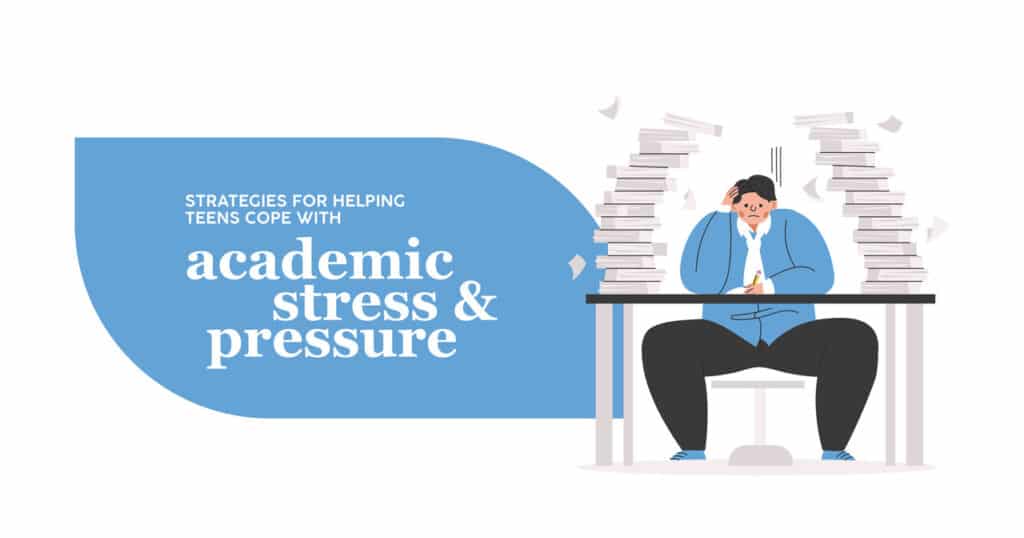Academic stress is a growing issue among teens, stemming from pressures to excel in school, manage extracurricular activities, and plan for the future. This anxiety can lead to depression and burnout, making it essential for parents, educators, and teens to learn strategies for managing stress. This guide explores the nature of academic pressure and provides actionable strategies to support mental well-being.
Essential Takeaways for Academic Stress and Pressure
- Open Communication is Key: Talk openly with teens about their sources of stress. A supportive environment can significantly help manage academic pressure.
- Balanced Lifestyle: Encourage a balance between academics, relaxation, and social activities. Regular physical activity, healthy sleep patterns, and hobbies are crucial for reducing stress.
- Teach Resilience & Time Management: Equip teens with resilience and time management skills, preparing them for both academic and life challenges.
Understanding Academic Stress in Teens
What is Academic Stress?
Academic stress is the psychological pressure teens experience due to schoolwork, exams, and expectations to perform well. This stress can arise from:
- Homework overload
- Test anxiety
- Pressure to achieve high grades or get into competitive colleges
A survey by the American Psychological Association revealed that nearly 1 in 3 teens feels overwhelmed by schoolwork, citing school as a major source of stress.
Signs of Academic Stress
Recognizing signs of stress in teens is crucial for early intervention:
- Emotional Signs:Anxiety, irritability, mood swings, or hopelessness.
- Physical Signs: Frequent headaches, stomachaches, fatigue, or sleep disturbances.
- Behavioral Signs: Procrastination, social withdrawal, declining performance, or reluctance to attend school.
By identifying these signs early, parents and educators can help teens develop coping mechanisms.
The Impact of Academic Pressure on Teen Mental Health
Short-Term Effects
In the short term, academic stress can impair concentration, cause sleep disturbances, and increase irritability. For example, cramming for exams often leads to anxiety, poor sleep, and underperformance, fueling further stress.
Long-Term Effects
Chronic academic stress can lead to:
- Anxiety disorders
- Depression
- Low self-esteem
- Burnout (physical, emotional, and mental exhaustion)
If unmanaged, this stress can impair cognitive function, hinder learning and memory, and reduce future opportunities, such as college prospects.
Effective Strategies for Helping Teens Cope with Academic Stress
1. Encourage Open Communication
Creating an environment where teens feel comfortable discussing their stress is essential. Parents and educators should regularly check in with teens and ask open-ended questions such as, “How are you feeling about school lately?” or “Is anything stressing you out?” This fosters trust and provides emotional support.
2. Teach Time Management Skills
Time management is critical for stress reduction. Encourage teens to:
- Create a study schedule that breaks tasks into manageable chunks. For example, study for 30 minutes each day leading up to an exam.
- Prioritize tasks by importance and deadlines, starting with the most challenging subjects first.
Using planners, calendars, or apps can help teens stay organized and reduce last-minute cramming.
3. Promote a Balanced Lifestyle
A balanced lifestyle helps teens manage stress more effectively. Encourage:
- Physical Activity: Regular exercise like walking, team sports, or yoga helps reduce stress.
- Hobbies & Social Activities: Make sure teens have time for leisure activities, such as reading, art, or hanging out with friends. These outlets are crucial for recharging.
- Healthy Sleep Patterns: Ensure teens get enough sleep (8-10 hours per night) to boost their academic performance and overall health.
4. Foster Healthy Study Habits
Creating a positive study environment is key. Ensure teens have a quiet, well-lit space with minimal distractions. Encourage the Pomodoro Technique (study for 25 minutes, followed by a 5-minute break) to maintain focus and avoid burnout.
5. Help Set Realistic Goals
Work with teens to set SMART goals (Specific, Measurable, Achievable, Relevant, Time-bound). For example, instead of “do well on my math test,” set a goal like “study for 30 minutes every day this week for my math test on Friday.” Celebrating small achievements can build confidence and reduce feelings of overwhelm.
6. Encourage Stress-Relief Techniques
Teach relaxation techniques such as:
- Deep Breathing: Calm the nervous system before stressful tasks, like taking a test.
- Mindfulness & Meditation: Apps like Headspace or Calm offer easy-to-follow guided meditations that help teens manage stress.
7. Seek Professional Support When Needed
If a teen experiences severe anxiety or depression, seeking professional help from a counselor or therapist is crucial. These professionals can offer coping tools and emotional support tailored to the teen’s needs.
The Role of Parents and Teachers in Reducing Academic Stress
1. Creating a Supportive Home Environment
Parents should set realistic expectations for academic performance and avoid putting unnecessary pressure on their teens. Encourage effort over perfection and model healthy stress management behaviors, such as exercise or hobbies, to reinforce the importance of balance.
2. Collaborating with Teachers and Schools
Teachers play a crucial role in addressing academic stress. Schools can promote mental health awareness and offer resources like tutoring or study skills workshops. Open communication between parents and teachers is vital to ensuring students receive the support they need.
Conclusion
Academic stress doesn’t have to define a teen’s experience. By recognizing the signs of stress, fostering open communication, and implementing effective coping strategies, teens, parents, and educators can work together to create a balanced environment that prioritizes mental health. With resilience-building techniques, stress-relief strategies, and time management skills, teens can successfully navigate academic pressures while maintaining their emotional well-being.
FAQs
- What are common signs of academic stress in teens?
- Emotional signs: Anxiety, irritability, mood swings. Physical signs: Headaches, fatigue. Behavioral changes: Procrastination, social withdrawal.
- How can I help my teen manage time better?
- Encourage a study schedule, prioritize tasks by importance, and use tools like planners to stay organized.
- What can teachers do to reduce academic stress?
- Teachers can provide flexibility, positive reinforcement, and extra support like tutoring or study skills workshops.
- How does academic stress impact long-term mental health?
- Long-term stress can lead to anxiety, depression, burnout, and decreased cognitive function, affecting learning and future opportunities.
- When should I seek professional help for my teen’s academic stress?
- Seek help if the teen shows severe anxiety, depression, or significant mental health issues related to academic pressure.




